
List of systems scientists
Encyclopedia
This is a list of systems scientists, people who made notable contributions in the field of the systems science
s:
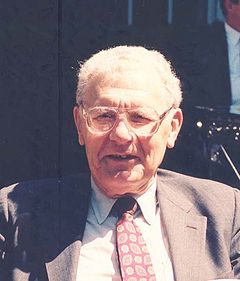
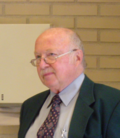
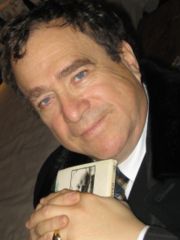
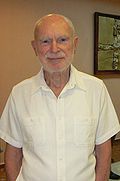
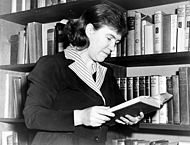
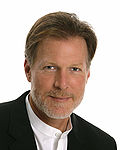

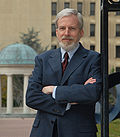

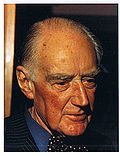
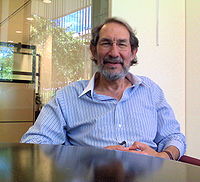
.jpg)
Systems science
Systems science is an interdisciplinary field of science that studies the nature of complex systems in nature, society, and science. It aims to develop interdisciplinary foundations, which are applicable in a variety of areas, such as engineering, biology, medicine and social sciences.Systems...
s:











.jpg)
A
- Russell L. AckoffRussell L. AckoffRussell Lincoln Ackoff was an American organizational theorist, consultant, and Anheuser-Busch Professor Emeritus of Management Science at the Wharton School, University of Pennsylvania. Ackoff was a pioneer in the field of operations research, systems thinking and management...
(1919) is an American scientist in the field of management science, operations researchOperations researchOperations research is an interdisciplinary mathematical science that focuses on the effective use of technology by organizations...
and systems theorySystems theorySystems theory is the transdisciplinary study of systems in general, with the goal of elucidating principles that can be applied to all types of systems at all nesting levels in all fields of research...
. - Genrich AltshullerGenrich AltshullerGenrikh Saulovich Altshuller , was a Soviet engineer, inventor, scientist, journalist and writer. He is most notable for the creation of the Theory of Inventive Problem Solving, better known by its Russia acronym TRIZ...
(1926–1998) was a Russian engineerEngineerAn engineer is a professional practitioner of engineering, concerned with applying scientific knowledge, mathematics and ingenuity to develop solutions for technical problems. Engineers design materials, structures, machines and systems while considering the limitations imposed by practicality,...
and scientist, and inventor of the Theory of Inventive Problem Solving. - Pyotr AnokhinPyotr AnokhinPyotr Kuzmich Anokhin was a Russian biologist and physiologist who made important contributions to cybernetics and functional systems. His pioneering concept on feedback were published in 1935.- Overview :...
(1898–1974) was a RussiaRussiaRussia or , officially known as both Russia and the Russian Federation , is a country in northern Eurasia. It is a federal semi-presidential republic, comprising 83 federal subjects...
n biologist and physiologist who made important contributions to cyberneticsCyberneticsCybernetics is the interdisciplinary study of the structure of regulatory systems. Cybernetics is closely related to information theory, control theory and systems theory, at least in its first-order form...
and functional systems. - Leo ApostelLeo ApostelLeo Apostel was a Belgian philosopher and professor at the Vrije Universiteit Brussel and the Universiteit Gent. Apostel was an advocate of interdisciplinary research and the bridging of the gap between exact science and humanities.- Biography :Leo Apostel was born Antwerp in 1925...
(1925–1995) was a Belgian philosopher who advocated of interdisciplinary research between exact scienceExact scienceAn exact science is any field of science capable of accurate quantitative expression or precise predictions and rigorous methods of testing hypotheses, especially reproducible experiments involving quantifiable predictions and measurements...
and humanitiesHumanitiesThe humanities are academic disciplines that study the human condition, using methods that are primarily analytical, critical, or speculative, as distinguished from the mainly empirical approaches of the natural sciences....
. - W. Brian ArthurW. Brian ArthurWilliam Brian Arthur is an economist credited with influencing and describing the modern theory of increasing returns. He has lived and worked in Northern California for many years. He is an authority on economics in relation to complexity theory, technology and financial markets...
(1945), is an Irish economist, is an expert on economics and complexity theory in technology and financial markets, and other applications. - W. Ross Ashby (1903–1972) was an English psychiatristPsychiatristA psychiatrist is a physician who specializes in the diagnosis and treatment of mental disorders. All psychiatrists are trained in diagnostic evaluation and in psychotherapy...
and a pioneer field of complex systemsComplex systemsComplex systems present problems in mathematical modelling.The equations from which complex system models are developed generally derive from statistical physics, information theory and non-linear dynamics, and represent organized but unpredictable behaviors of systems of nature that are considered...
.
B
- Per BakPer BakPer Bak was a Danish theoretical physicist who coauthored the 1987 academic paper that coined the term "self-organized criticality."- Life and work :...
(1948–2002) was a Danish theoretical physicist, to whom is attributed the development of the concept of self-organized criticalitySelf-organized criticalityIn physics, self-organized criticality is a property of dynamical systems which have a critical point as an attractor. Their macroscopic behaviour thus displays the spatial and/or temporal scale-invariance characteristic of the critical point of a phase transition, but without the need to tune...
. - Bela H. BanathyBéla H. BánáthyBéla Heinrich Bánáthy was a Hungarian linguist, systems scientist and a professor at San Jose State University and UC Berkeley. Bánáthy was the founder of the White Stag Leadership Development Program whose leadership model was adopted across the United States...
(1919–2003) was a Hungarian systems scientist, design scientist, educator, author and coordinator of many international systems research conferences. - Béla A. BánáthyBéla A. BánáthyBéla Antal Bánáthy is an American systems scientist, who teaches part-time at the International Systems Institute at the Saybrook Graduate School.- Biography :...
(1946?) is an American systems scientist, who works at the International Systems Institute at the Saybrook Graduate School. - Yaneer Bar-YamYaneer Bar-YamYaneer Bar-Yam is an American physicist, systems scientist, and founding president of the New England Complex Systems Institute.-Biography:...
(1959) is an American physicistPhysicistA physicist is a scientist who studies or practices physics. Physicists study a wide range of physical phenomena in many branches of physics spanning all length scales: from sub-atomic particles of which all ordinary matter is made to the behavior of the material Universe as a whole...
, systems scientist and founding president of the New England Complex Systems InstituteNew England Complex Systems InstituteThe New England Complex Systems Institute is an American research institution dedicated to advancing the study of complex systems. It was founded in 1996 and is located in Cambridge, MA.- Overview :...
. - Gregory BatesonGregory BatesonGregory Bateson was an English anthropologist, social scientist, linguist, visual anthropologist, semiotician and cyberneticist whose work intersected that of many other fields. He had a natural ability to recognize order and pattern in the universe...
(1904–1980) was a British anthropologist, social scientist, linguist, and cyberneticistCyberneticistA cyberneticist or a cybernetician is a person who practices cybernetics.Heinz von Foerster once told Stuart Umpleby that Norbert Wiener preferred the term "cybernetician" rather than "cyberneticist", perhaps because Wiener was a mathematician rather than a physicist.On the other hand, Nicolas...
whose work intersected that of many other fields. - Kenneth D. BaileyKenneth D. Bailey (sociologist)Kenneth D. Bailey is an American sociologist, systems scientist and professor of sociology at the University of California in Los Angeles.- Biography :...
(1943) is an American sociologist, who worked in the field of research methods, systems theorySystems theorySystems theory is the transdisciplinary study of systems in general, with the goal of elucidating principles that can be applied to all types of systems at all nesting levels in all fields of research...
and environmental demography and ecology. - Stafford Beer (1926–2002) was a British management scientist, known for his work in the fields of operational research and managementManagementManagement in all business and organizational activities is the act of getting people together to accomplish desired goals and objectives using available resources efficiently and effectively...
cyberneticsCyberneticsCybernetics is the interdisciplinary study of the structure of regulatory systems. Cybernetics is closely related to information theory, control theory and systems theory, at least in its first-order form...
. - Harold Stephen BlackHarold Stephen BlackHarold Stephen Black was an American electrical engineer, who revolutionized the field of applied electronics by inventing the negative feedback amplifier in 1927. To some, his invention is considered the most important breakthrough of the twentieth century in the field of electronics, since it...
(1898–1983) was an American electrical engineer, who revolutionized the field of applied electronics by inventing the negative feedbackNegative feedbackNegative feedback occurs when the output of a system acts to oppose changes to the input of the system, with the result that the changes are attenuated. If the overall feedback of the system is negative, then the system will tend to be stable.- Overview :...
amplifier in 1927. - Alexander BogdanovAlexander BogdanovAlexander Aleksandrovich Bogdanov –7 April 1928, Moscow) was a Russian physician, philosopher, science fiction writer, and revolutionary of Belarusian ethnicity....
(1873–1928) was a Russian physician, philosopher, economist, science fiction writer, and revolutionary. - Kenneth E. BouldingKenneth E. BouldingKenneth Ewart Boulding was an economist, educator, peace activist, poet, religious mystic, devoted Quaker, systems scientist, and interdisciplinary philosopher. He was cofounder of General Systems Theory and founder of numerous ongoing intellectual projects in economics and social science. He was...
(1910–1993) was a British economist, educator, peace activist, poet, religious mystic, devoted Quaker, systems scientist, and interdisciplinary philosopher. - Murray BowenMurray BowenMurray Bowen, M.D., was an American psychiatrist and a professor in Psychiatry at the Georgetown University. Bowen was among the pioneers of family therapy and founders of systemic therapy...
(1913–1990) was an American psychiatristPsychiatristA psychiatrist is a physician who specializes in the diagnosis and treatment of mental disorders. All psychiatrists are trained in diagnostic evaluation and in psychotherapy...
and pioneers of family therapy and systemic therapySystemic TherapySystemic therapy is a form of psychotherapy which seeks to address people not on individual level, as had been the focus of earlier forms of therapy, but as people in relationship, dealing with the interactions of groups and their interactional patterns and dynamics.- History :Systemic therapy has...
. - Valentino BraitenbergValentino BraitenbergValentino Braitenberg is an Italian neuroscientist and cyberneticist...
(1926) is German neurologistNeurologistA neurologist is a physician who specializes in neurology, and is trained to investigate, or diagnose and treat neurological disorders.Neurology is the medical specialty related to the human nervous system. The nervous system encompasses the brain, spinal cord, and peripheral nerves. A specialist...
and cyberneticist and pioneer in embodied cognitive scienceEmbodied cognitive scienceEmbodied Cognitive Science is an interdisciplinary field of research, the aim of which is to explain the mechanisms underlying intelligent behavior...
. - Richard Peirce BrentRichard Brent (scientist)Richard Peirce Brent is an Australian mathematician and computer scientist, born in 1946. He holds the position of Distinguished Professor of Mathematics and Computer Science with a joint appointment in the Mathematical Sciences Institute and the College of Engineering and Computer Science at...
(1946) is an Australian mathematicianMathematicianA mathematician is a person whose primary area of study is the field of mathematics. Mathematicians are concerned with quantity, structure, space, and change....
and computer scientistComputer scientistA computer scientist is a scientist who has acquired knowledge of computer science, the study of the theoretical foundations of information and computation and their application in computer systems....
who is known for Brent's methodBrent's methodIn numerical analysis, Brent's method is a complicated but popular root-finding algorithm combining the bisection method, the secant method and inverse quadratic interpolation. It has the reliability of bisection but it can be as quick as some of the less reliable methods...
of root finding. - Gerrit BroekstraGerrit BroekstraGerrit Broekstra , is a Dutch scientist and professor in the field of organization behavior and systems sciences at the Erasmus Universiteit, Rotterdam, Northwestern University, Chicago, and Nyenrode Business University in the Netherlands.- Biography :Broekstra was born in 1941 in Alkmaar in Holland...
(1941) is a Dutch scientist and professor of organizational behavior and systems sciences. - Walter F. BuckleyWalter F. BuckleyWalter Frederick Buckley was an American professor of sociology. He was among the first to apply concepts from general systems theory , based on the work of Bertalanffy, to sociology. The sociologist was not specifically aligned to either the cybernetics or the general systems movements.-...
(1922–2006) was an American sociologist, and among the first to apply General systems theory to sociology.
C
- Donald T. CampbellDonald T. CampbellDonald Thomas Campbell was an American social scientist. He is noted for his work in methodology. He coined the term "evolutionary epistemology" and developed a selectionist theory of human creativity.- Biography :...
(1916–1996) was an American social scientistSocial ScientistSocial Scientist is a New Delhi based journal in social sciences and humanities published since 1972....
, who coined the term evolutionary epistemologyEvolutionary epistemologyEvolutionary epistemology refers to two distinct topics - on the one hand, the biological evolution of cognitive mechanisms in animals and humans, and on the other hand, a theory in that knowledge itself evolves by natural selection....
. - Peter ChecklandPeter ChecklandPeter Checkland is a British management scientist and emeritus professor of Systems at Lancaster University. He is the developer of soft systems methodology : a methodology based on a way of systems thinking.- Biography :...
(1930) is a British management scientist, who developed soft systems methodology. - Harold ChestnutHarold ChestnutHarold Chestnut was an American electrical engineer, who contributed to the development of the fields of control theory and systems engineering.- Biography :...
(1918–2001) was an American electrical engineer and, who wrote some classic books about systems engineeringSystems engineeringSystems engineering is an interdisciplinary field of engineering that focuses on how complex engineering projects should be designed and managed over the life cycle of the project. Issues such as logistics, the coordination of different teams, and automatic control of machinery become more...
. - C. West ChurchmanC. West ChurchmanCharles West Churchman was an American philosopher and systems scientist, who was Professor at the School of Business Administration and Professor of Peace and Conflict Studies at the University of California, Berkeley...
(1913–2004) was an American philosopher in the field of management science, operations researchOperations researchOperations research is an interdisciplinary mathematical science that focuses on the effective use of technology by organizations...
and systems thinkingSystems thinkingSystems thinking is the process of understanding how things influence one another within a whole. In nature, systems thinking examples include ecosystems in which various elements such as air, water, movement, plants, and animals work together to survive or perish...
. - James J. CollinsJames Collins (Boston University)James J. Collins is an American bioengineer, Professor of Biomedical Engineering at Boston University, and a Howard Hughes Medical Institute Investigator...
is an American bioengineer and Professor of Biomedical Engineering at Boston UniversityBoston UniversityBoston University is a private research university located in Boston, Massachusetts. With more than 4,000 faculty members and more than 31,000 students, Boston University is one of the largest private universities in the United States and one of Boston's largest employers...
. He is one of the founders of the emerging field of synthetic biologySynthetic biologySynthetic biology is a new area of biological research that combines science and engineering. It encompasses a variety of different approaches, methodologies, and disciplines with a variety of definitions...
, and a pioneering researcher in systems biologySystems biologySystems biology is a term used to describe a number of trends in bioscience research, and a movement which draws on those trends. Proponents describe systems biology as a biology-based inter-disciplinary study field that focuses on complex interactions in biological systems, claiming that it uses...
, stochastic resonanceStochastic resonanceStochastic resonance is a phenomenon that occurs in a threshold measurement system when an appropriate measure of information transfer is maximized in the presence of a non-zero level of stochastic input noise thereby lowering the response...
, biological dynamics and neurostimulation. - Gerhard ChroustGerhard ChroustGerhard Chroust is an Austrian systems scientist, and Professor Emeritus for Systems Engineering and Automation at the Institute of System Sciences at the Johannes Kepler University of Linz, Austria...
(1941) is an Austrian systems scientist, and Professor Emeritus for Systems Engineering and Automation at the Institute of System Sciences at the Johannes Kepler University of Linz, Austria.
D
- Vladimir DamgovVladimir DamgovVladimir Nikolov Damgov was a Bulgarian physicist, mathematician, union leader and parliamentarian. He contributed particularly to the application of Chaos theory to mechanical and radiophysical systems as well as to space exploration and space studies.- Biography :Vladimir Damgov was born in...
(1947–2006) was a Bulgarian physicist, mathematician, union leader and parliamentarian, who particularly contributed to the application of chaos theoryChaos theoryChaos theory is a field of study in mathematics, with applications in several disciplines including physics, economics, biology, and philosophy. Chaos theory studies the behavior of dynamical systems that are highly sensitive to initial conditions, an effect which is popularly referred to as the...
. - Herman DalyHerman DalyHerman Daly is an American ecological economist and professor at the School of Public Policy of University of Maryland, College Park in the United States....
(1938) is an American ecological economist. - George DantzigGeorge DantzigGeorge Bernard Dantzig was an American mathematical scientist who made important contributions to operations research, computer science, economics, and statistics....
(1914–2005) was an American mathematician who is considered the "father of linear programmingLinear programmingLinear programming is a mathematical method for determining a way to achieve the best outcome in a given mathematical model for some list of requirements represented as linear relationships...
".
E
- David EastonDavid EastonDavid Easton is a Canadian political scientist who was born in Toronto, Ontario, went to the United States in 1943, and is currently Distinguished Research Professor in the Department of Political Science at the University of California, Irvine.He is a former President of the American Political...
(1917) is a Canadian political scientist, who developed application of systems theory to political sciencePolitical sciencePolitical Science is a social science discipline concerned with the study of the state, government and politics. Aristotle defined it as the study of the state. It deals extensively with the theory and practice of politics, and the analysis of political systems and political behavior...
. - Frederick Edmund Emery (1925–1997) was an Australian psychologist, and pioneers in the field of Organizational development.
- Hugo O. EngelmannHugo O. EngelmannHugo Otto Engelmann was an American sociologist, anthropologist and general systems theorist. Throughout his work he emphasized the significance of history.- Biography :...
(1917–2002) was an American sociologist, anthropologist and general systems theorist. - Joshua M. EpsteinJoshua M. EpsteinJoshua M. Epstein is Professor of Emergency Medicine at Johns Hopkins University, and a member of the External Faculty of the Santa Fe Institute.- Early life and Education:Epstein was born in New York City and grew up in Amherst....
is an American expert in social and economic dynamics, and member of the Santa Fe InstituteSanta Fe InstituteThe Santa Fe Institute is an independent, nonprofit theoretical research institute located in Santa Fe and dedicated to the multidisciplinary study of the fundamental principles of complex adaptive systems, including physical, computational, biological, and social systems.The Institute houses a...
. - Hugh EverettHugh EverettHugh Everett III was an American physicist who first proposed the many-worlds interpretation of quantum physics, which he termed his "relative state" formulation....
(1930–1982) was an American physicist, who developed the use of generalized lagrange multipliers in operations researchOperations researchOperations research is an interdisciplinary mathematical science that focuses on the effective use of technology by organizations...
.
F
- J. Doyne FarmerJ. Doyne FarmerJ. Doyne Farmer is an American physicist and entrepreneur, with interest in chaos theory and complexity. He is a professor at the Santa Fe Institute. He was also a member of Eudaemonic Enterprises.-Biography:...
(1952) is an American physicist, and one of the founding fathers of chaos theoryChaos theoryChaos theory is a field of study in mathematics, with applications in several disciplines including physics, economics, biology, and philosophy. Chaos theory studies the behavior of dynamical systems that are highly sensitive to initial conditions, an effect which is popularly referred to as the...
. - Mitchell FeigenbaumMitchell FeigenbaumMitchell Jay Feigenbaum is a mathematical physicist whose pioneering studies in chaos theory led to the discovery of the Feigenbaum constants.- Biography :...
(1944) is an American mathematical physicist whose pioneering studies in chaos theoryChaos theoryChaos theory is a field of study in mathematics, with applications in several disciplines including physics, economics, biology, and philosophy. Chaos theory studies the behavior of dynamical systems that are highly sensitive to initial conditions, an effect which is popularly referred to as the...
led to the discovery of the Feigenbaum constantsFeigenbaum constantsThe Feigenbaum constants are two mathematical constants named after the mathematician Mitchell Feigenbaum. Both express ratios in a bifurcation diagram.The first Feigenbaum constant ,...
. - Peter C. FishburnPeter C. FishburnPeter C. Fishburn is known as a pioneer in the field of decision-making processes.He received his B.S. in industrial engineering from Pennsylvania State University in 1958, his M.S...
(1936) is an American scientist known as a pioneer in the field of decision making processes. - Heinz von FoersterHeinz von FoersterHeinz von Foerster was an Austrian American scientist combining physics and philosophy. Together with Warren McCulloch, Norbert Wiener, John von Neumann, Lawrence J. Fogel, and others, Heinz von Foerster was an architect of cybernetics.-Biography:Von Foerster was born in 1911 in Vienna, Austria,...
(1911–2002) was an Austrian-American scientist combining physics and philosophy. Together with Warren McCulloch, Norbert Wiener, and John von Neumann, Heinz von Foerster was the architect of cyberneticsCyberneticsCybernetics is the interdisciplinary study of the structure of regulatory systems. Cybernetics is closely related to information theory, control theory and systems theory, at least in its first-order form...
. - Jay Forrester (1918) is an American computer engineer, known as founder of System DynamicsSystem dynamicsSystem dynamics is an approach to understanding the behaviour of complex systems over time. It deals with internal feedback loops and time delays that affect the behaviour of the entire system. What makes using system dynamics different from other approaches to studying complex systems is the use...
, which deals with the simulation of interactions between objects in dynamic systems. - Charles FrançoisCharles FrançoisCharles François, , is a Belgian administrator, editor and scientist in the field of cybernetics, systems theory and systems science, internationally known for his main work the International Encyclopedia of Systems and Cybernetics.- Biography :...
(1922) is a Belgian specialist in the field of cyberneticsCyberneticsCybernetics is the interdisciplinary study of the structure of regulatory systems. Cybernetics is closely related to information theory, control theory and systems theory, at least in its first-order form...
and systems science, known as founding editor of the International Encyclopedia of Systems and CyberneticsInternational Encyclopedia of Systems and CyberneticsThe book International Encyclopedia of Systems and Cybernetics is an authoritative encyclopedia for systems theory, cybernetics, the complex systems science, which covers both theories and applications in areas as engineering, biology, medicine and social sciences... - Christian Fuchs (1976) is an Austrian social scientist who focuses his research on information societyInformation societyThe aim of the information society is to gain competitive advantage internationally through using IT in a creative and productive way. An information society is a society in which the creation, distribution, diffusion, use, integration and manipulation of information is a significant economic,...
theory, social theory, critical theoryCritical theoryCritical theory is an examination and critique of society and culture, drawing from knowledge across the social sciences and humanities. The term has two different meanings with different origins and histories: one originating in sociology and the other in literary criticism...
. - Buckminster FullerBuckminster FullerRichard Buckminster “Bucky” Fuller was an American systems theorist, author, designer, inventor, futurist and second president of Mensa International, the high IQ society....
(1895–1983) was an American visionary, designer, architect, poet, author, and inventor. He was one of the first to propagate a systemic worldview and explored principles of energy efficiencyEfficient energy useEfficient energy use, sometimes simply called energy efficiency, is the goal of efforts to reduce the amount of energy required to provide products and services. For example, insulating a home allows a building to use less heating and cooling energy to achieve and maintain a comfortable temperature...
and material efficiencyMaterial efficiencyMaterial efficiency is a description or metric which expresses the degree in which usage of raw materials, construction projects or physical processes are used or carried out in a manner which consumes, incorporates, or wastes less of a given material compared to previous measures...
in the fields of architecture, engineering and design.
G
- Murray Gell-MannMurray Gell-MannMurray Gell-Mann is an American physicist and linguist who received the 1969 Nobel Prize in physics for his work on the theory of elementary particles...
(1929) is an American physicist and Nobel Prize winner in physics for his work on the theory of elementary particles. - Ralph Waldo Gerard (1900–1974) was an American neurophysiologist and behavioral scientist and one of the founders of the Society for General Systems Research.
- Tom GilbTom GilbTom Gilb is an American systems engineer, consultant, and author, known for the development of software metric, software inspection, and evolutionary processes.- Biography :...
(1940) is an American systems engineer. - Harry H. GoodeHarry H. GoodeHarry H. Goode was an American computer engineer and systems engineer and professor at the University of Michigan. He is known as co-author of the book Systems Engineering from 1957, which is one of the earliest significant books directly related to systems engineering.-Biography:Harry Goode was...
(1909–1960) was an American computer engineer and systems engineer and professor at University of Michigan. Until his death his was president of the National Joint Computer Committee (NJCC). He wrote the famous System Engineering Handbook together with Robert Engel Machol. - Brian GoodwinBrian GoodwinBrian Carey Goodwin was a Canadian mathematician and biologist, a Professor Emeritus at the Open University and a key founder of the field of theoretical biology.He made key contributions to the foundations of biomathematics, complex systems and generative models in developmental biology...
(1931) is a Canadian mathematician and biologist
H
- Arthur David Hall IIIArthur David Hall IIIArthur David Hall III was an American electrical engineer and a pioneer in the field of systems engineering. He is known as author of a widely used engineering textbook "A Methodology for Systems Engineering" from 1962.- Biography :Hall attended Brookville High School in Lynchburg, Virginia. He...
(1925–2006) was an American electrical engineer. He worked for years at Bell Labs. He was one ot the founders of the (IEEE) and was among the first general systems theorists. He wrote A methodology of Systems Engineering from 1962. - Debora HammondDebora HammondDebora Hammond is an American historian of science, Provost and Professor Interdisciplinary Studies of the Hutchins School of Liberal Studies at the Sonoma State University...
is an American historian of science and a systems scientist. - Stephen G. HainesStephen G. HainesStephen G. Haines is an American organizational theorist, management consultant, author of books on management and systems thinking, and an international recognized leader in strategic planning and strategic change.- Biography :Stephen Haines has a B.S...
(1945) is an American organizational theorist, management consultant, - Friedrich HayekFriedrich HayekFriedrich August Hayek CH , born in Austria-Hungary as Friedrich August von Hayek, was an economist and philosopher best known for his defense of classical liberalism and free-market capitalism against socialist and collectivist thought...
(1899–1992) was a Nobel prize economist and a philosopher who made pioneering contributions to complexity theory. He notably wrote The Theory of Complex Phenomena (1967). - Derek HitchinsDerek HitchinsDerek K. Hitchins is a British systems engineer and was professor in engineering management, in command & control and in systems science at Cranfield University at Cranfield, Bedfordshire, England.- Biography :...
(1932 (?)) is a British systems engineer and was professor in engineering managementEngineering managementEngineering Management or Management Engineering is a specialized form of management and engineering that is concerned with the application of engineering principles to business practice...
, in command & controlCommand and Control (government)In management, command and control refers more generally to the maintenance of authority with somewhat more distributed decision making. In these civilian contexts, the term "command" is unfashionable but the meaning is the same. Some management science theorists even hold that the idea is now...
and in systems scienceSystems scienceSystems science is an interdisciplinary field of science that studies the nature of complex systems in nature, society, and science. It aims to develop interdisciplinary foundations, which are applicable in a variety of areas, such as engineering, biology, medicine and social sciences.Systems...
at the Cranfield University, Bedfordshire, England. - John Henry HollandJohn Henry HollandJohn Henry Holland is an American scientist and Professor of Psychology and Professor of Electrical Engineering and Computer Science at the University of Michigan, Ann Arbor. He is a pioneer in complex systems and nonlinear science. He is known as the father of genetic algorithms. He was awarded...
(1929) is an American pioneer in complex system and nonlinear science. He is known as the father of genetic algorithms.
J
- Michael C. JacksonMichael C. JacksonMichael Christopher Jackson OBE is a British systems scientist, consultant and Professor of Management Systems and Dean of Hull University Business School....
(1951) is a British systems scientist, and expert in Systems ThinkingSystems thinkingSystems thinking is the process of understanding how things influence one another within a whole. In nature, systems thinking examples include ecosystems in which various elements such as air, water, movement, plants, and animals work together to survive or perish...
, Organizational Cybernetics, Creative Problem Solving and Critical Systems Thinking. - Gwilym JenkinsGwilym JenkinsGwilym Meirion Jenkins was a Welsh statistician and systems engineer, born in Gowerton , Swansea, Wales. He is most notable for his pioneering work with George Box on autoregressive moving average models, also called Box-Jenkins models, in time-series analysis.He earned a first class honors degree...
(1933–1982) was a British statistician and systems engineer - Clarence JohnsonClarence JohnsonClarence Leonard "Kelly" Johnson was an aircraft engineer and aeronautical innovator. As a member and first team leader of the Lockheed Skunk Works, Johnson worked for more than four decades and is said to have been an "organizing genius"...
(1910–1990) was an American aircraft engineer and aeronautical innovator.
K
- Rudolf Emil Kalman (1930) is an American-Hungarian mathematical system theorist, who is an electrical engineer by training.
- J. A. Scott KelsoJ. A. Scott KelsoJ. A. Scott Kelso is a neuroscientist, and Professor of Complex Systems and Brain Sciences, Professor of Psychology, Biological Sciences and Biomedical Science at Florida Atlantic University in Boca Raton, Florida and The University of Ulster in Derry, N...
(1947) is an Irish neuroscientistNeuroscientistA neuroscientist is an individual who studies the scientific field of neuroscience or any of its related sub-fields...
, who in 1985 he founded the Center for Complex Systems and Brain SciencesCenter for Complex Systems and Brain SciencesThe Center for Complex Systems and Brain Sciences is a multi-disciplinary research institute, internationally active in the fields of complexity science and neuroscience. The center is located in the Charles E. Schmidt College of Science, Florida. This center was founded by J. A...
. - George KlirGeorge KlirGeorge Jiri Klir is a Czech-American computer scientist and professor of systems sciences at the Center for Intelligent Systems at Binghamton University in Binghamton, New York.- Biography :...
(1932) is a Czech-American computer scientist and professor of systems sciences at the Center for Intelligent Systems at the Binghamton University in New York. Author of several texts on systems, including Architecture of Systems Problem Solving. - Klaus KrippendorffKlaus KrippendorffKlaus Krippendorff Frankfurt am Main, is the Gregory Bateson professor for Cybernetics, Language, and Culture at the Annenberg School for Communication, University of Pennsylvania, Philadelphia, USA.- Overview :...
(1932) is a German cyberneticistCyberneticistA cyberneticist or a cybernetician is a person who practices cybernetics.Heinz von Foerster once told Stuart Umpleby that Norbert Wiener preferred the term "cybernetician" rather than "cyberneticist", perhaps because Wiener was a mathematician rather than a physicist.On the other hand, Nicolas...
, working on the mathematical foundations of cybernetics, general systems, communication and information theories.
L
- Christopher LangtonChristopher LangtonChristopher Langton is an American computer scientist and one of the founders of the field of artificial life. He coined the term in the late 1980s when he organized the first "Workshop on the Synthesis and Simulation of Living Systems" at the Los Alamos National Laboratory in 1987.Langton made...
(1949) is an American biologist and one of the founders of the field of artificial life. - Ervin LászlóErvin LászlóErvin László is a Hungarian philosopher of science, systems theorist, integral theorist, originally a classical pianist. He has published about 75 books and over 400 papers, and is editor of World Futures: The Journal of General Evolution...
(1932) is a Hungarian philosopher of science, systems theorist, integral theorist, and classical pianist. - Loet LeydesdorffLoet LeydesdorffLoet Leydesdorff is a Dutch sociologist, cyberneticist and Senior Lecturer at the University of Amsterdam. He is known for his work in the sociology of communication and innovation.- Biography :...
(1948) is a Dutch sociologist and cyberneticistCyberneticistA cyberneticist or a cybernetician is a person who practices cybernetics.Heinz von Foerster once told Stuart Umpleby that Norbert Wiener preferred the term "cybernetician" rather than "cyberneticist", perhaps because Wiener was a mathematician rather than a physicist.On the other hand, Nicolas...
, known for his work sociology of communicationCommunicationCommunication is the activity of conveying meaningful information. Communication requires a sender, a message, and an intended recipient, although the receiver need not be present or aware of the sender's intent to communicate at the time of communication; thus communication can occur across vast...
and innovationInnovationInnovation is the creation of better or more effective products, processes, technologies, or ideas that are accepted by markets, governments, and society...
. - Edward Norton LorenzEdward Norton LorenzEdward Norton Lorenz was an American mathematician and meteorologist, and a pioneer of chaos theory. He discovered the strange attractor notion and coined the term butterfly effect.-Biography:...
(1917) is an American mathematician and meteorologist, and an early pioneer of the chaos theory. - Niklas LuhmannNiklas LuhmannNiklas Luhmann was a German sociologist, and a prominent thinker in sociological systems theory.-Biography:...
(1927–1998) was a German sociologist, who developed a systems theory applicable in political sciencePolitical sciencePolitical Science is a social science discipline concerned with the study of the state, government and politics. Aristotle defined it as the study of the state. It deals extensively with the theory and practice of politics, and the analysis of political systems and political behavior...
from Talcott ParsonsTalcott ParsonsTalcott Parsons was an American sociologist who served on the faculty of Harvard University from 1927 to 1973....
works.
M
- Robert Engel Machol (1917–1998) was an American systems engineer and expert in the fields of operations research.
- Humberto R. Maturana (1928),
- Donella MeadowsDonella MeadowsDonella H. "Dana" Meadows was a pioneering American environmental scientist, teacher and writer. She is best known as lead author of the influential book The Limits to Growth, which made headlines around the world.- Life :Born in Elgin, Illinois, Meadows was educated in science, receiving a B.A...
(1941–2001) was an American environmental scientist, known as lead author of Limits to GrowthLimits to GrowthThe Limits to Growth is a 1972 book modeling the consequences of a rapidly growing world population and finite resource supplies, commissioned by the Club of Rome. Its authors were Donella H. Meadows, Dennis L. Meadows, Jørgen Randers, and William W. Behrens III. The book used the World3 model to...
. - Dennis MeadowsDennis MeadowsDennis L. Meadows is an American scientist and Emeritus Professor of Systems Management, and former director of the Institute for Policy and Social Science Research at the University of New Hampshire...
(1942) is an American economist and systems scientist, known as coauthor of Limits to GrowthLimits to GrowthThe Limits to Growth is a 1972 book modeling the consequences of a rapidly growing world population and finite resource supplies, commissioned by the Club of Rome. Its authors were Donella H. Meadows, Dennis L. Meadows, Jørgen Randers, and William W. Behrens III. The book used the World3 model to...
. - Mihajlo D. MesarovicMihajlo D. MesarovicMihajlo D. Mesarovic , is a Yugoslavian scientist, who is a professor of Systems Engineering and Mathematics at Case Western Reserve University...
, - Margaret MeadMargaret MeadMargaret Mead was an American cultural anthropologist, who was frequently a featured writer and speaker in the mass media throughout the 1960s and 1970s....
(1901–1978), - Warren McCulloch (1899–1969)
- James Grier MillerJames Grier MillerJames Grier Miller was an American biologist, a pioneer of systems science, who originated the modern use of the term "behavioral science", founded and directed the multi-disciplinary Mental Health Research Institute at the University of Michigan, and originated the living systems theory.-...
(1916), - Melanie MitchellMelanie MitchellMelanie Mitchell is a professor of computer science at Portland State University. She has worked at the Santa Fe Institute and Los Alamos National Laboratory...
is an American scientist - Edgar MorinEdgar MorinEdgar Morin is a French philosopher and sociologist born Edgar Nahoum in Paris on July 8, 1921. He is of Judeo-Spanish origin. He is known for the transdisciplinarity of his works.- Biography :...
(1921) is a French philosopher and sociologist.
O
- Eugene OdumEugene OdumEugene Pleasants Odum was an American scientist known for his pioneering work on ecosystem ecology. He wrote the first ecology textbook: Fundamentals of Ecology....
(1913–2002) was an American scientist known for his pioneering work on ecosystem ecology. - Howard Thomas Odum (1924–2002) was an American ecosystem ecologist.
- Linda OldsLinda OldsLinda E. Olds is an American psychologist, consultant, trainer, Emeritus professor at Linfield College and pioneer in the field of systems psychology.- Biography :...
(1946 (?)) is an American psychologistPsychologistPsychologist is a professional or academic title used by individuals who are either:* Clinical professionals who work with patients in a variety of therapeutic contexts .* Scientists conducting psychological research or teaching psychology in a college...
and pioneer in the field of systems psychology. - David OrrellDavid OrrellDavid John Orrell is a Canadian mathematician and author who is living in Oxford, England. He received his doctorate in mathematics from the University of Oxford. His work in the prediction of complex systems such as the weather, genetics and the economy has been featured in New Scientist,...
is a Canadian mathematician.
P
- Bradford ParkinsonBradford ParkinsonBradford Parkinson is an American engineer and inventor, and United States Air Force colonel best known as the father of the Global Positioning System....
is an American systems engineer - Talcott ParsonsTalcott ParsonsTalcott Parsons was an American sociologist who served on the faculty of Harvard University from 1927 to 1973....
(1902–1979), - Gordon PaskGordon PaskAndrew Gordon Speedie Pask was an English cybernetician and psychologist who made significant contributions to cybernetics, instructional psychology, experimental epistemology and educational technology....
(1928–1996), - Samuel C. PhillipsSamuel C. PhillipsGeneral Samuel Cochran Phillips was a United States Air Force four star general who served as Director of NASA's Apollo Manned Lunar Landing Program from 1964 to 1969, the seventh Director of the National Security Agency from 1972 to 1973, and as Commander, Air Force Systems Command from 1973 to...
(1921–1990) was an officer in the U.S. Air Force. - Ilya PrigogineIlya PrigogineIlya, Viscount Prigogine was a Russian-born naturalized Belgian physical chemist and Nobel Laureate noted for his work on dissipative structures, complex systems, and irreversibility.-Biography :...
(1917–2003),
R
- Simon RamoSimon RamoSimon "Si" Ramo is an American physicist, engineer, and business leader. He led development of microwave and missile technology and is sometimes known as the father of the intercontinental ballistic missile...
(1913) is an American physicist, engineer, and business leader. - Anatol RapoportAnatol RapoportAnatol Rapoport was a Russian-born American Jewish mathematical psychologist. He contributed to general systems theory, mathematical biology and to the mathematical modeling of social interaction and stochastic models of contagion.-Biography:...
(1911–2007) was a Russian mathematician, psychologist and systems scientist. He is cofounder of the International Society for Systems Science. - Eberhardt RechtinEberhardt RechtinEberhardt Rechtin was an American systems engineer and respected authority in aerospace systems and systems architecture.- Biography :...
(1926–2006) was an American systems engineer and respected authority in aerospace systems and systems architecture. - Barry RichmondBarry RichmondBarry Richmond was an American systems scientist, and former managing director of High Performance Systems, Inc , an organization providing software and consulting services to build the capacity of people to understand and improve the workings of dynamic systems...
(1947–2002) was an American systems scientist, - Robert Rosen (1943) is an American biologist and systems thinker
S
- Claude Shannon (1916–2001)
- Thomas B. SheridanThomas B. SheridanThomas B. Sheridan is American professor of mechanical engineering and Applied Psychology Emeritus at the Massachusetts Institute of Technology. He is a pioneer of robotics and remote control technology.- Biography :...
(1931) is American mechanical engineeringMechanical engineeringMechanical engineering is a discipline of engineering that applies the principles of physics and materials science for analysis, design, manufacturing, and maintenance of mechanical systems. It is the branch of engineering that involves the production and usage of heat and mechanical power for the...
and pioneer of roboticsRoboticsRobotics is the branch of technology that deals with the design, construction, operation, structural disposition, manufacture and application of robots...
and remote controlRemote controlA remote control is a component of an electronics device, most commonly a television set, used for operating the television device wirelessly from a short line-of-sight distance.The remote control is usually contracted to remote...
technology. - Herbert SimonHerbert SimonHerbert Alexander Simon was an American political scientist, economist, sociologist, and psychologist, and professor—most notably at Carnegie Mellon University—whose research ranged across the fields of cognitive psychology, cognitive science, computer science, public administration, economics,...
(1916–2001), - Henk G. SolHenk G. SolHenk Gerard Sol is a Dutch organizational theorist and Professor of Business Engineering and ICT at Groningen University. His research focuses on the development of services enabled by ICT, management information systems, decision enhancement and telematics.- Biography :Henk Sol was born in 1951...
(1951) is a Dutch organizational theorist, consultant, - Georgiy StarostinGeorgiy StarostinGeorgiy Sergeevich Starostin is a Russian linguistics researcher at the Center of Comparative Studies at the Russian State University for the Humanities, and a participant at the Santa Fe Institute's Evolution of Human Languages project...
(1976) is a Russian linguisticsLinguisticsLinguistics is the scientific study of human language. Linguistics can be broadly broken into three categories or subfields of study: language form, language meaning, and language in context....
researcher at and a participant at the Santa Fe InstituteSanta Fe InstituteThe Santa Fe Institute is an independent, nonprofit theoretical research institute located in Santa Fe and dedicated to the multidisciplinary study of the fundamental principles of complex adaptive systems, including physical, computational, biological, and social systems.The Institute houses a...
's Evolution of Human Languages project.
U
- Stuart A. Umpleby (1944) is an American cyberneticistCyberneticistA cyberneticist or a cybernetician is a person who practices cybernetics.Heinz von Foerster once told Stuart Umpleby that Norbert Wiener preferred the term "cybernetician" rather than "cyberneticist", perhaps because Wiener was a mathematician rather than a physicist.On the other hand, Nicolas...
working in the field of cross-cultural management, cybernetics, group facilitation methods, systems science and the use of computer networks.
V
- Francisco J. Varela (1945–2001),
- Geoffrey VickersCharles Geoffrey VickersSir Charles Geoffrey Vickers VC was an English lawyer, administrator, writer and pioneering systems scientist...
(1894–1982), - Ludwig von BertalanffyLudwig von BertalanffyKarl Ludwig von Bertalanffy was an Austrian-born biologist known as one of the founders of general systems theory . GST is an interdisciplinary practice that describes systems with interacting components, applicable to biology, cybernetics, and other fields...
(1901–1972) was an Austrian Canadian biologist, fysiologist and systems scientist, and cofounder of the International Society for Systems Science.
W
- John Nelson Warfield (1928(?)) is an American electrical engineering and systems scientist, and member of the Academic Committee of the International Encyclopedia of Systems and Cybernetics.
- Kevin WarwickKevin WarwickKevin Warwick is a British scientist and professor of cybernetics at the University of Reading, Reading, Berkshire, United Kingdom...
(1954) is a British Cybernetician with interests in artificial intelligence, robotics, control systems and biomedical engineering, especially implant technology. - Duncan J. WattsDuncan J. WattsDuncan J. Watts is an Australian researcher and a principal research scientist at Yahoo! Research, where he directs the Human Social Dynamics group. He is also a past external faculty member of the Santa Fe Institute and a former professor of sociology at Columbia University, where he headed the...
is an American professor of sociology - Paul WatzlawickPaul WatzlawickPaul Watzlawick was an Austrian-American psychologist and philosopher. A theoretician in communication theory and radical constructivism, he has commented in the fields of family therapy and general psychotherapy...
(1921–2007), - Geoffrey WestGeoffrey WestGeoffrey Brian West is a British theoretical physicist, former president and distinguished professor of the Santa Fe Institute. He is one of the leading scientists working on a scientific model of cities...
(1940) is a Britisch physicist. - Douglas R. WhiteDouglas R. WhiteDouglas R. White is an American complexity researcher , social anthropologist, sociologist, and social network researcher at the University of California, Irvine.-Biography:...
(1942) is an American complexity researcher, social anthropologist and sociologist. - Brian Wilson is a British systems scientist, known for his development of Soft systems methodology.
- Stephen WolframStephen WolframStephen Wolfram is a British scientist and the chief designer of the Mathematica software application and the Wolfram Alpha computational knowledge engine.- Biography :...
(1959) is English theorist known for his work in theoretical particle physics, cellular automata, complexity theory, and computer algebra. - A. Wayne WymoreA. Wayne WymoreA. Wayne Wymore was an American mathematician and systems engineer. He gained both his B.Sc. and M.Sc. from the Iowa State University, and his PhD in mathematics from the University of Wisconsin–Madison....
(1927) is an American mathematician and systems engineer. Founder and first Chairman of Systems and Industrial Engineering (SIE) Department at the University of Arizona. - Warren WeaverWarren WeaverWarren Weaver was an American scientist, mathematician, and science administrator...
(1894–1978) was an American mathematician and communication scientist. - Norbert WienerNorbert WienerNorbert Wiener was an American mathematician.A famous child prodigy, Wiener later became an early researcher in stochastic and noise processes, contributing work relevant to electronic engineering, electronic communication, and control systems.Wiener is regarded as the originator of cybernetics, a...
(1894–1964) was an American mathematician and one of the founders of cybernetics.
Z
- Lotfi Asker ZadehLotfi Asker ZadehLotfali Askar Zadeh , better known as Lotfi A. Zadeh, is a mathematician, electrical engineer, computer scientist, artifical intelligence researcher and professor emeritus of computer science at the University of California, Berkeley...
- Erik Christopher ZeemanErik Christopher ZeemanSir Erik Christopher Zeeman FRS , is a Japanese-born British mathematician known for his work in geometric topology and singularity theory....
(1925) is a Japanese-born British mathematician known for work in geometric topology and singularity theory. - Gerard de ZeeuwGerard de ZeeuwGerard de Zeeuw is a Dutch scientist and professor Mathematical modelling of complex social systems at the University of Amsterdam in the Netherlands.- Biography :...
(1936) is a Dutch scientist and professor Mathematical modelling of complex social systems at the University of Amsterdam in the Netherlands.
See also
- List of systems engineers
- People in systems and controlPeople in systems and controlThis is an alphabetical list of people who have made significant contributions in the fields of system analysis and control theory.-Active researchers:-Historical figures in systems and control:...
- List of systems sciences organizations
External links
- Collaborative projects of the ISSS with a lot of information about the field of systems science.
- Principia Cybernetica website.
- A history of cybernetics

